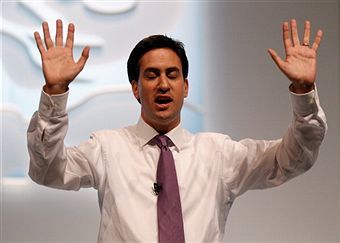 I have been so annoyed by Ed Miliband’s speech to Labour Party conference that I
haven’t been able to bring myself to write about it.
I have been so annoyed by Ed Miliband’s speech to Labour Party conference that I
haven’t been able to bring myself to write about it.
As the Tories gather in Manchester I should really be turning my thoughts to things Conservative, but I can’t stop thinking about last Tuesday.
In Liverpool Labour loyalists kept telling me to read the whole thing again – and there is no doubt that this is a serious attempt to redefine the centre-ground of British politics. Polly Toynbee from the left and Peter Oborne agreed that this was an important, near-epochal attack on vested interests.
According to Toynbee, far from lurching to the Left, Miliband was speaking for the common man and woman: “Even after the crash Labour dared not speak a word of blame, but this leader was ready to say what you hear outside any school gate, in any pub, on any doorstep. As he berated ‘fast-buck’ traders, something for nothing ‘predators’, ‘asset strippers’, ‘vested interests’, ‘cosy cartels’, ‘rigged markets’ and ‘Britain’s closed circles’, here was the answer to what drives Ed Miliband on.”
If anything, Oborne was even more admiring: “Miliband made an intellectually ambitious and admirable contribution to public debate. He sought to reshape the terms of political argument and so redefine the territory on which the general election will ultimately be fought. He has even made a tentative step towards tearing up the rules that have defined British economics for the past generation with his cautious critique of capitalism as it has been carried on here for the past 30 years.”
They may both be correct in their analysis of the Labour leader’s words. But a political speech is not the same as a policy paper. A party leader’s conference speech is a set-piece spectacular, a slice of showbiz. In opposition, it is the only part of the week’s events that is guaranteed to make the news bulletins. It must inspire and uplift the demoralised and defeated.
Ed Miliband’s 2011 speech, if it is remembered for anything at all, will go down in history as the moment the Labour party faithful booed their most successful leader. This happened because Miliband fluffed his lines, pausing after evoking is predecessors rather than rattling through the namechecks. Miliband still has to learn that a political leader, like a stand-up comedian, needs to make his audience feel safe in his hands – especially when the routine is a bit edgy.
No one who was there in the hall will forget David Cameron’s Blackpool conference speech in 2005, which effectively won him the Tory leadership. But I would challenge anyone to remember the substance, which differed very little from the mainstream compassionate conservatism of David Davis. Tony Blair’s conference speeches were often fluffy confections, but they succeeded in tickling the hall and appealing to viewers watching from home.
I understand this all feeds into the Toynbee-Oborne argument that Miliband’s speech had more substance than we are used to from our political leaders. Ultimately, this is what frustrates me most. Miliband may well have a visionary alternative to the growth-free austerity policies of the government. But right now he is just shouting into the abyss.






Comments